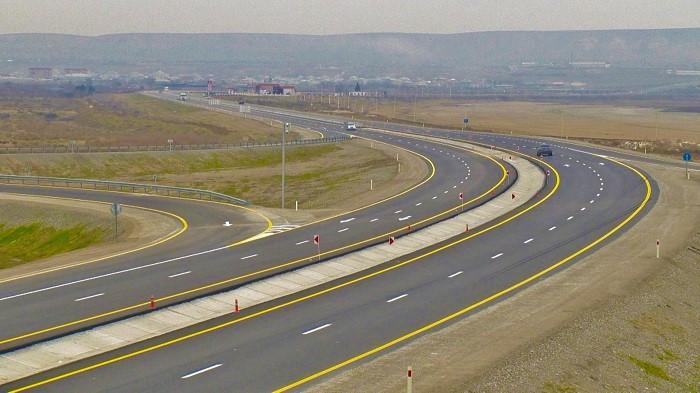|
|
TODAY.AZ / Politics
Road from Aghdam to Khankendi - prospects of communication lines
14 August 2023 [10:00] - TODAY.AZ

The Aghdam-Khankendi railway was built in 1979 on the initiative and under the leadership of national leader Heydar Aliyev. Heydar Aliyev, who always paid special attention to the development of Garabagh, attached particular importance to the construction of railway lines in the region. Thanks to the opening of the Baku-Yevlakh-Khankendi railway, the socio-economic and cultural development of Garabagh accelerated, and its ties with Baku were strengthened. In addition to improving the material and technical supply of the population, this also significantly improved the economic performance of the region. Thus, due to lower costs for the supply of raw materials and transportation of products, the cost of products manufactured in Garabagh has significantly decreased. All this was achieved precisely as a result of the efforts of the national leader.
Azernews presents some statistical data on the significance of the communication lines passing through Aghdam in Khankendi, and their prospects for the region with reference to Azertag.
In the 80s of the last century, the annual turnover of cargo transportation on the section of the Barda-Aghdam railway line of the Yevlakh-Khankendi line was 1.5 million tons, and on the section of the Aghdam-Khankendi railway line (27 kilometers) - 1 million tons. At that time, the speed of trains was 60 km/h on the Barda-Aghdam railway line, 40 km/h on the Aghdam-Khankendi railway line.

As a result of the occupation by Armenia of 20 percent of the territory of Azerbaijan in the early 1990s, the railway sector of the republic, as well as other sectors of the economy, suffered significant damage. Along with the equipment, an important part of the railways of Azerbaijan was occupied, the activity of the Yevlakh-Khankendi railway was stopped, the Aghdam, Askaran and Khankendi stations of this line were seized, the railways were brutally destroyed by the Armenians.
Thirty years later, under the leadership of the victorious Supreme Commander-in-Chief Ilham Aliyev, life is being revived in our liberated lands - the construction of new railway lines in these regions is being implemented.
It should be noted that by the Decree of the President of the Republic of Azerbaijan dated November 24, 2020, the design and construction of the Barda-Aghdam railway line has begun. At present, 90 percent of the design work has been completed, physical progress in the construction and installation work of the line is 70 percent. Long-length rails with a length of 56.951 km were laid, and the first stage of earthworks, construction of engineering structures, laying of elements of the superstructure of the track and turnouts were fully completed. By the end of this year, it is planned to complete the design and construction of the Barda-Aghdam railway line.
We present the following information on the technical indicators of the project and the scope of work:
- The length of the line, taking into account the side branches, is 57.857 km, including 47.1 km along the axis;
- the volume of earthworks is 1,368,816 cubic meters;
- Stations (4 units): Barda, Kocharli, Tazakand and Aghdam;
- Number of engineering structures - 130 units;
• Including 3 bridges, 1 viaduct, 7 animal crossings, 85 drainage pipes, 1 elevated crossing and 33 emergency crossings;
- In general, the project has 16 interchanges at the same level with the highway, including 9 with a barrier and 7 without a barrier;
- Number of turnouts - 34 units;
- The length of communication and signaling systems - 47.1 km;
The predicted speed of trains is 80 km/h, the annual turnover of cargo transportation is 1.5 million tons.

How to transport goods to Garabagh faster and more efficiently?
At one time, the communication lines passing through Aghdam - automobile and railway - provided the needs of the inhabitants of Khankendi, Shusha and Lachin. The shortest route from Baku to Khankendi, Shusha, Lachin ran through Aghdam. The use of the Baku-Yevlakh-Aghdam-Khankendi-Shusha-Lachin highway was more efficient. This road is able to provide faster and more efficient delivery of humanitarian cargo.
It should be noted that in the 1980s, the republican road R-28 Yevlakh-Khojaly-Lachin, which runs through the center of the city of Aghdam, was used to travel from Baku to Khankendi and Shusha. In the same years, from the 40th kilometer of the Aghdam-Barda road, a two-lane Aghdam ring road of local significance was laid with a length of 17.5 km, which ran up to the administrative territory of the Askaran region bypassing the center of the city of Aghdam, and before the occupation of Azerbaijani lands by Armenia, the entire population of Garabagh, as well as the population of the Lachin districts constantly used this road.
Recall that the distance from the city of Aghdam to the Askaran district is 6 kilometers, to the city of Khankendi - 23 kilometers, and from Khankendi to the city of Shusha - 11 kilometers. The distance from Baku to Aghdam is 360 kilometers, to Khankendi - 383 kilometers, to Shusha - 394 kilometers and to Lachin - 435 kilometers.
In accordance with the infrastructure restoration project in the territories liberated from occupation, the construction of four-lane highways of the first technical category Barda-Aghdam, 44.5 kilometers long, and Aghdam-Fuzuli, 65.7 kilometers long, is in full swing. The capacity of both highways is 17,000 vehicles per day.
Before the conflict, the Baku-Yevlakh-Aghdam-Khankendi-Shusha-Lachin highway and the Baku-Aghdam-Khankendi railway line played an important role in the development of Garabagh. Despite the fact that the railway line was out of order during the occupation, it is quite possible to get there and back by motorway. Therefore, the excuses of the Armenians are inappropriate. Today, the economic potential of Azerbaijan allows us to solve, among other things, the social issues of our Armenian residents in Garabagh. Since this region is the territory of Azerbaijan, all communications must now run through our state. At present, there are three airports in the Garabagh economic region and adjacent districts - in Ganja, Yevlakh and Fuzuli. This creates the basis for turning the region into a hub for transport and logistics projects. So, due to the proximity of airports to the city of Barda, transportation of goods along the Barda-Aghdam road and the Barda-Aghdam railway would avoid wastage of time. In this regard, the Aghdam-Khankendi road acquires great significance.
It should also be noted that the Azerbaijan allowed the use of the Aghdam-Khankendi road to meet the needs of Armenian minority in Garabagh. Our state is determined to reintegrate the ethnic Armenians living in Garabagh as equal citizens into the political, legal, economic and social framework of Azerbaijan. Therefore, Armenia must strictly comply with its obligations and not interfere in the internal affairs of states, not harm the integration of persons belonging to national minorities, and not incite separatism in the territory of neighboring states.
URL: http://www.today.az/news/politics/237789.html
 Print version
Print version
Connect with us. Get latest news and updates.
See Also
- 02 November 2024 [16:59]
Large-scale event to be held in Ankara to commemorate Azerbaijan's Victory Day - 02 November 2024 [15:23]
Work begins on inclusion of "Ateshgah Temple" in UNESCO's World Heritage List - 02 November 2024 [14:10]
Azerbaijan's Ministry of Foreign Affairs extended condolences to Serbia - 02 November 2024 [13:36]
Information visits to Baku Stadium organized - 02 November 2024 [11:45]
Azerbaijan's Ombudsperson meets with professor Ilber Ortayli - 01 November 2024 [15:11]
Ambassador: Pakistan to be highly represented at COP29 - 01 November 2024 [14:49]
Uzbekistan participates in COP29 - 01 November 2024 [13:41]
European Parliament mires in corruption and fraud - 01 November 2024 [12:06]
President Ilham Aliyev sends congratulatory letter to President of Algeria - 01 November 2024 [11:45]
Next plenary meeting of Milli Majlis begins
Most Popular
 Armenian Church prepares a provocation in Geneva
Armenian Church prepares a provocation in Geneva
 Alternative energy to be used in ASAN service centers
Alternative energy to be used in ASAN service centers
 EU and Japan announced conclusion of Strategic and defense partnership
EU and Japan announced conclusion of Strategic and defense partnership
 European Parliament mires in corruption and fraud
European Parliament mires in corruption and fraud
 ASELSAN introduces its new drone hunter at SAHA EXPO
ASELSAN introduces its new drone hunter at SAHA EXPO
 US and China conducted secret prisoner exchange last month
US and China conducted secret prisoner exchange last month
 Japan, US and Republic of Korea strongly condemn North Korea's ICBM launch
Japan, US and Republic of Korea strongly condemn North Korea's ICBM launch
